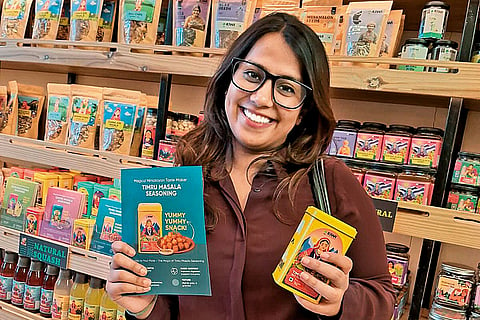Some 40km west of Dehradun, surrounded by tea gardens and farmland, lies the town of Vikasnagar. Growing up there in the ’90s, Abhinav Ahluwalia learnt the tricks of the retail trade in his father’s grocery store that saw a constant flow of customers throughout the day.
Meet the Dehradun Start-up Bringing Regional Foods to National Shelves
An agri-wellness start-up is redefining food retail by taking locally sourced regional produce from farm to shelf
The rural was never far from his heart. In 2009, Ahluwalia enrolled at the school of rural management at KIIT University in Bhubaneswar. In 2012, the year after he graduated, he started working as an agriculture consultant for the Gujarat government—a firsthand understanding of how the rural economy works.
This education stood him in good stead when he joined the family business in 2013 and began training farmers on incorporating organic practices on the side.
In 2015, fate brought Nnupur Agarwaal, a social entrepreneur, into his life. Agarwaal had recently returned from the UK—where she studied at Lancaster University—and was volunteering in farming communities. Her blend of rural fieldwork and grassroots activism made her a natural partner for Ahluwalia.
First Steps
The duo launched their agri-wellness start-up, Kiwi Kisan Window, in 2017. The idea behind the brand was to source produce directly from farmers and farmer-producer organisations, process it into wellness products and sell them through their own branded stores and online platforms.
The first retail outlet came up in Dehradun in 2017. The second followed in 2019 in Chandigarh. Over 2020 and 2021, the founders invested in the manufacturing unit and processing plant and by 2025, the brand had eight retail outlets.
At the heart of the expansion was the founders’ mission to meet a growing consumer appetite for mindful eating and authentic flavours.
“We work with farmers who use integrated pest management, combining minimal chemical use with natural methods when possible. We invest in farmer training on safe application methods and proper protective gear. And yes, we pay premium prices to those transitioning to safer practices,” says Agarwaal.

Backing the Vision
Headquartered in Dehradun, the company secured angel round funding of ₹80 lakh in 2019 from Neha Kant and Pankaj Vermani, founders of apparel brand Clovia. On season four of reality TV show Shark Tank India, aired in January 2025, it secured ₹2.5 crore from Kunal Bahl, cofounder of e-commerce company Snapdeal.
The company’s founders are in the right place at the right time. According to the India Brand Equity Foundation, a government-backed trade-promotion body, India’s online grocery market is projected to grow from $4.5bn in 2022 to $76.7bn by 2032, a robust annual growth rate of 32.7%.
Riding the organic-grocery boom comes with challenges such as managing supply chain logistics, maintaining quality while scaling and handling inventory
This optimism is reflected in the company’s growth plans. In the last financial year, Kiwi Kisan Window recorded a revenue of around ₹7.5 crore. The goal for the next financial year is to reach ₹20–22 crore in revenue, a threefold increase.
The company has a larger five-year vision but is focusing for the moment on its 12- and 24-month targets. The plan, according to Ahluwalia, is to raise more funds by the end of the current financial year to aid the brand’s pan-India expansion and grow distribution through their own retail stores.
“Affluent and aspirational India continues to move towards premium consumption and for them, there is a huge white space when it comes to groceries. That is where the Trader Joe’s of India comes into play,” says Clovia’s Vermani.
Growing Pains and Gains
But riding the organic-grocery boom has come with its share of challenges. Managing supply chain logistics, maintaining quality while scaling and handling inventory are major hurdles in the sector, says Ahluwalia, who had to ensure that as the start-up grew, quality was not compromised with higher volumes.
“Quick and efficient delivery across India is also a challenge due to the rise of quick commerce and e-commerce,” he says.
Running operations from a Tier-II city has its pros and cons. The company has around 75 full-time staff in different states. “One challenge is difficulty in attracting and hiring talent, as many skilled professionals prefer to stay in metros,” says Ahluwalia, who initially struggled to find the right human resources and convince them to move to Dehradun.
Logistically, operating from a Himalayan town adds extra days to delivery times.
But there are positives too.
“Dehradun allowed us to test products in smaller markets before expanding. Lower real estate and operational costs also helped the company establish a strong base before scaling up,” says Ahluwalia. The city’s fresh air and environment contributed to better manufacturing and processing conditions, a unique benefit, he adds.
This helps further the brand’s mission of targeting buyers above the age of 35 who value quality and wellness. In the meantime, the company is charting its course to becoming a pan-India brand, spotlighting regional and culinary diversity on the way.